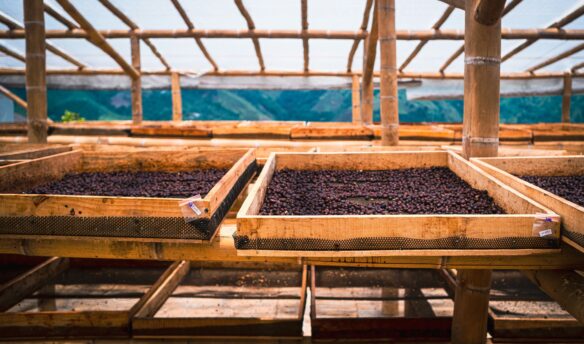Science now backs the saying, “Don’t talk to me until I’ve had my coffee.” Plus, many U.S. roasters cut ties with Brazilian coffees, and Starbucks gives salaried staff a 2% raise while executives cash in on multi-million-dollar incentives.
‘US Roasters Shun Brazil Coffee After 50% Tariffs Kick In’ – via Bloomberg
Trump’s 50% tariff on Brazilian imports sent an immediate jolt through the coffee industry. Importers rushed to get coffee shipments into the country before the tariffs came into effect on August 7; Brazilian exporters looked for alternative buyers for their beans; and, after months of trending downward, coffee prices began to go up again.
Brazil is the world’s largest producer of coffee, and the U.S. buys 30% of its coffee from Brazil. Many analysts thought that, while imports might slow down because of tariffs, American companies would continue purchasing coffee from the country. However, a new report from Ilena Peng, Mumbi Gitau and Dayanne Sousa at Bloomberg suggests that U.S. companies are cooling down their coffee buying in hopes of an eventual exemption or policy reversal.
Some buyers are “avoiding new contracts and looking for wiggle room in existing ones to avoid having to pay the higher levies,” they write. Other buyers have requested extended shipping timelines in anticipation that “tariffs may be eased later.”
Deals between the two countries have “totally stalled. No one’s really buying anything,” according to broker Thiago Cazarini.
Sourcing coffee from other regions could prove tricky, as few coffee-producing countries can match Brazil in terms of volume and price. Many roasters use Brazilian coffee as the base of their blends, with some reluctant to change longstanding recipes. Several roasters who spoke to Bloomberg said they were trying to stretch their remaining coffee reserves in hopes that the tariff policy changes soon.
Either way, the tariffs are taking a toll. “Absorbing a 10% tariff is nearly impossible for a small business to do entirely on its own,” said Daria Whalen, director of coffee for Ritual Coffee Roasters in San Francisco. “Some of that has to be passed to customers — and 50% feels staggering and insurmountable.”
Read more on the latest tariff consequences here or via Yahoo! Finance here.
‘Ecological Farming Practices Are Extremely Complex, Just Ask The Ants’ – via Sprudge
Sustainable coffee farming is on the rise, with more farmers replacing pesticides with natural pest control practices. One such control is using beneficial insects to help manage pests, such as the parasitic wasp that Hawaii is looking to release to combat the coffee berry borer beetle. However, a new study from the University of Michigan shows that it isn’t quite as simple as switching chemicals for critters.
For the study, published in Proceedings of the National Academy of Sciences, researchers examined the relationships between non-native ant species and a predator fly on Puerto Rican coffee farms. Two of the ant species are used as biological pest controls on the farms, while the fly preys on one of the ants. The researchers found that any of the species could be dominant at any one time, and these shifting relationships “generate chaos” that makes it difficult to anticipate how they will act on a coffee farm and thus how effective their use as pest control will be.
“Two of the three ant species we studied are really important agents of biological control of two of the important pests in coffee,” John Vandermeer, one of the study authors, said in a press release. “We would like, or a farmer would like, to be able to predict when the ants are going to be there, and when they’re not going to be there. And it turns out that that kind of prediction is going to be pretty difficult.”
The different species interacted within the coffee farm system in two ways. First there’s what’s called intransitive loop cyclic behavior. Any of the three ant species might dominate any of the others: Ant A beats Ant B, which beats Ant C, but Ant C could also beat Ant A.
Introducing a predator, like a fly, complicates things. It might prey upon the dominant ant, which throws the whole ecosystem into disarray, allowing one of the other ants to become dominant. That’s predator-mediated coexistence, and the way the relationships change is known as oscillations.
By tracking these oscillations, the researchers were able to look more closely at the insect relationships and, in theory, anticipate when each species would dominate and help farmers plan their biological control strategy more effectively.
“We believe that the current international agricultural system with its use of pesticides and chemicals is not contributing to the welfare of anybody, especially the farmers, and is actually contributing quite a bit to global climate change,” Vandermeer said. “We take the position that in order to incorporate the rules of ecology into the development of new forms of agriculture, we need to understand what those rules are and how those rules work.”
Read the full story on the ant antics here.
‘Starbucks’ CEO Is Ditching a Merit System and Giving All Salaried Staff a Flat 2% Pay Raise Instead’ – via Fortune
Almost immediately after taking the top job last year, new Starbucks CEO Brian Niccol announced plans to turn around the ailing coffee chain. He launched a campaign called “Back to Starbucks,” promising to rejuvenate the company in the face of falling sales and rising discontent among workers and customers.
Alongside moves like bringing sofas back for customers to lounge in and asking baristas to write customers’ names on every cup, Starbucks plans to cut costs by laying off over 1,000 corporate workers and scaling back discounts and promotions. This year, instead of leaving raises to managers’ discretion, the company is giving all salaried employees in North America a flat 2% increase.
Previously, managers had a say in how much of a raise their direct reports received. But this is changing as Starbucks pours money into other parts of the business, reports Nino Paolo for Fortune. “As we make these significant investments, we need to carefully manage all our other costs,” the company noted in an internal email obtained by the Wall Street Journal.
The new raise policy applies to salaried employees in corporate, manufacturing, distribution, and store management—but not to hourly baristas. Back in April, union delegates negotiating a first contract rejected the company’s offer of guaranteed annual raises of at least 2%. The inflation rate in the United States stands at 2.7% for the 12 months ending July 2025.
While salaried workers are seeing raises capped at less than the inflation rate for the year, Starbucks has offered executives up to $6 million in stock grants if their work is found to “expedite the company’s turnaround efforts,” according to Fortune. Stock grants are when a company issues shares of its stock as part of a compensation package or to reward performance. According to an SEC filing, the incentives are “directly tied to the achievement of key components of the Back to Starbucks plan to encourage our senior leaders to achieve these goals as quickly as possible.”
Unionized baristas—now more than a year into contract negotiations—were quick to point out the lofty incentives for executives. “Starbucks cannot tell us that there is no money to put into a fair union contract for baristas when they paid Brian [Niccol] $96 million for 120 days of work in 2024 and have allocated millions upon millions for a glitzy manager conference and C-Suite bonuses,” bargaining delegate and barista Jasmine Leli told Fortune.
Read more on Starbucks salaries here.
More News
‘Study Suggests Farm-Level Bacterial Communities Affect Coffee Flavor’ – via Daily Coffee News
‘Black Rock Coffee Bar Files for IPO Showing Narrowing Losses’ – via Bloomberg
‘Best of Congo Sees Multiple 88+ Coffees, Auction Ends Friday’ – via Daily Coffee News
‘Starbucks Expects Non-Binding Bids for China Business Within Two Weeks, Sources Say’ – via Reuters
‘Study Says Liberica and Excelsa Are Separate Species with Implications for Cultivation’ – via Daily Coffee News
Is Coffee Good For You?
In news that will surprise no one, researchers from Germany and the United Kingdom have found that drinking coffee in the morning improves your mood.
For the study, published in Scientific Reports, the researchers observed 236 young adults in Germany over the course of four weeks, who filled out short surveys seven times each day. Participants noted their mood and whether they had consumed caffeine within the previous 90 minutes using their smartphones, which allowed the researchers to investigate caffeine’s effects in the real world instead of in a lab.
The study found that participants reported feeling happier and more energetic on mornings when they’d had coffee compared to mornings when they didn’t have coffee. The effect was less noticeable later in the day.
Caffeine intake was also associated with reduced negative feelings such as sadness or irritability. However, these effects were weaker and not correlated with the time of day a participant consumed coffee.
“Taken together, this study provides evidence that caffeine consumption is associated with increases in momentary positive affect in everyday life, with effects being particularly pronounced shortly after waking up (i.e., in the morning),” the authors conclude. Which we probably could have told them.
Beyond the Headlines
‘Baristas May Not Love Your Sugary Drinks, but They’re Happy You’re Happy’ by Kelly Broder
















